Class collaboration destroys the global left
La Marx International
The global left is in the midst of a profound crisis, setbacks, and disintegration worldwide. This is because 99% of leftist groups have adopted a policy of class collaboration , or "popular frontism," which consists of"progressive"bourgeois capitalist governments or coalitions. This policy represents a breakwith the Marxist principle of class independence, thus triggering a serious crisis. The victory of reformist Zohran Mamdani as mayor of New York City exacerbates this global crisis for the left because it further promotes popular frontism .
Since the founding of the Progressive International (PI) in May 2020, there has been an acceleration in the movement of organizations toward populist fronts. The PI is an international organization funded by imperialism and guided by the US State Department, serving to promote the tendency of left-wing organizations to adopt the policy of calling for a " progressive common front," " unity, " and a "united front" with progressive bourgeois coalitions in various instances of class struggle. Major Wall Street corporations, such as those of George Soros, allocate capital to finance political campaigns and "progressive" organizations , while a strong process of NGO-ization has developed within left-wing organizations worldwide.
The priority of 99% of left-wing organizations is electoral intervention in bourgeois democracy, which entails a multi-million dollar financing business based on the diversion of funds from the bourgeois state. The entire process results in the development within left-wing groups of policies linked to the laws governing the development of the bourgeois democratic regime, such as "critical voting" in elections, support for "progressive" laws of bourgeois parties, the formation of parliamentary political blocs with progressive bourgeois forces, entry into these coalitions, and the placement of officials, ministers, and advisors in their governments.
The day-to-day politics of leftist groups are becoming increasingly similar, unleashing a profound process that is blurring the political and programmatic boundaries between organizations. This implies a change in the relationship between them: While decades ago Trotskyists and Stalinists, or guerrillas, clashed publicly over political and programmatic differences, now these frictions tend to disappear, and there is a de facto unity among the groups that unanimously advocate the same policy of class collaboration.
Alongside this rightward shift in the leadership of global left-wing groups, there is a conversely occurring leftward shift in sectors of the mass movement. The crisis of capitalism and the revolutionary rise of the masses give rise to a radicalized activism that develops outside of all parties and groups of the global left. This activism instinctively rejects the reformist, populist-front, and treacherous course of the global left, which in turn gives rise to all kinds of new political phenomena such as the front lines, the movement for Palestine, the Gen Z movement, etc., which we will analyze later.
We begin this work by showing in detail how the left carries out the Popular Front policy in various regions and countries of the world. Since class collaboration and the Popular Front are the classic policies of social democracy and Stalinism, we focus our work on the situation of groups that refer to themselves as "Trotskyists." We place the word "Trotskyists" in quotation marks ironically, because in reality their leaders broke with Trotskyism and Marxism long ago.
USA: The "Trotskyists" capitulate to Mamdani, and the imperialist Democratic Party
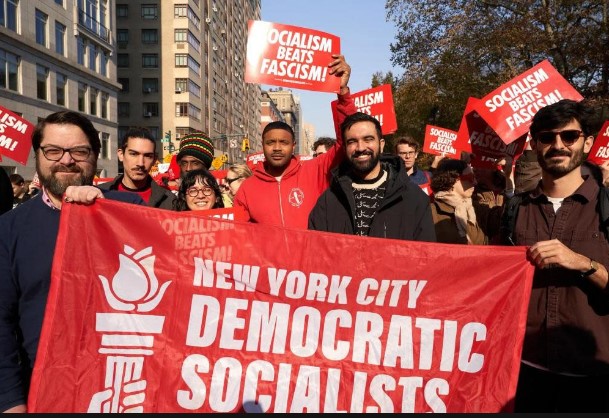
Zohran Mamdani, mayor-elect of New York, with DSA militants
Zohran Mamdani's victory as mayor of New York City highlighted a broad leftward shift within sectors of the mass movement in the United States. Without this leftward shift, it would have been impossible for a social democrat to win the New York mayoralty, given the Democratic Party's split in two and the formidable traditional Democratic Party apparatus working against Mamdani . The global process of political revolution and the leftward shift within sectors of the mass movement has given rise to a new activism that embraces Marxist and socialist ideas, manifested in the growth of the Democratic Socialist Association of America (DSA), which forms the basis of the Progressive International (PI). The DSA is a social democratic organization to which Zohran Mamdani belongs, led by Representatives Rashida Tlaib and Alexandria Ocasio-Cortez, but it is part of the imperialist Democratic Party and fields candidates on its ballots.
DSA seeks to divert the workers' and popular upsurge toward the dead end of reformism, thus fulfillingthe role of acting as a pressure-release valve for the political regime. Through its publication, Jacobin Magazine, DSA provides a constellation of pundits and paid charlatans who work to justify the reformist strategy and support "progressive" capitalist governments worldwide. The objective of IP, DSA, and Jacobin Magazine is to abort and sterilize any radicalized current that might arise, preventing the development of a revolutionary Marxist current independent of the imperialist state.
Several groups that identify as Trotskyist are within the DSA, thereby betraying the principles of Marxism and joining the imperialist Democratic Party. Among them is Socialist Alternative (SA), led by Seattle councilwomanKshama Sawant, who comes from the militant tradition of Great Britain. Also included is Solidarity, the group that adheres to the current historically known as Mandelism and has appropriated the name"Fourth International,"linked to the NPA of France.
Also within the DSA are Reform & Revolution, which claims to be a follower of Trotsky, and the Tempest Collective, which has a centrist policy toward the DSA, thus capitulating to the Progressive International. We will not elaborate here on Red Star, or the Marxist Unity Group, which are of Stalinist origin, or Bread and Roses, Marxist Unity Group, and the Socialist Majority, which are avowedly of social democratic origin; we will only point out that all these sectors betray the American people by supporting the imperialist Democratic Party. And that, in addition to capitulating to US imperialism, they lie to activists by presenting themselves as "Marxists."
But after the initial enthusiasm, the treacherous policy of supporting the Democratic Party led the DSA into a serious crisis during the Biden-Harris administration. The NATO massacre of Palestinians, which earned the Democratic government the nickname "Genocide Joe," coupled with rising poverty, inflation, the cost of living, and inequality, led millions to repudiate the Democrats. This triggered a crisis within the DSA, a collapse in membership, the sinking of its finances, and a wave of dismissals of leaders and paid political operatives. However, Trump's rise to power and his rapid decline in prestige allowed for a partial recovery for the Democrats and the DSA, and now Mamdani's victory in New York is being used to try to revitalize the DSA among young people and activists.
England: The "Trotskyists" capitulate to Jeremy Corbyn
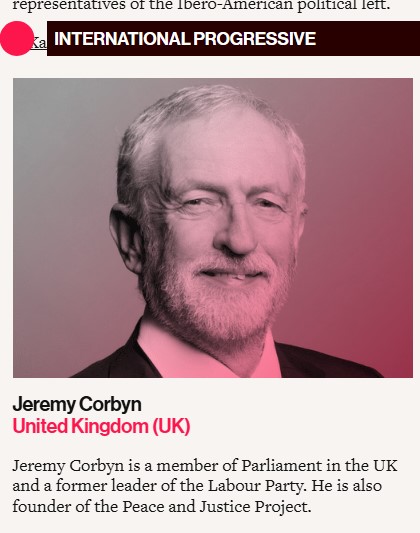
Jeremy Corbyn, leader of the Progressive International, launched a new "progressive" party in Britain, modeled after Spain's "Podemos" .
In England, Jeremy Corbyn, former leader of the Labour Party, along with fellow former Labour MP Zarah Sultana, have launched a new "progressive" party provisionally called "Your Party". Corbyn and Sultana are leaders of the Progressive International, and the party they have launched is the same version of Podemos in Spain, Syriza in Greece, or Die Linke in Germany. Corbyn and Sultana 's new party must be denounced immediately because it seeks to divert the workers' and popular movement toward the dead end of reformism, just like DSA. But far from denouncing it and offering an alternative, groups stemming from the rich tradition of English Trotskyism, led in the 20th century by Ted Grant, Gerry Healy, and Tony Cliff, are calling on the workers and people of Great Britain to join the Progressive International party.
The call to join Corbyn's party is being spearheaded by the Socialist Workers Party (SWP-UK), led by Alex Callinicus, Joseph Choonara, and economist Michael Roberts. Also calling for a move to Corbyn's party are the Revolutionary Communist Party (RCP), led by Alan Woods and Fiona Lali; the Socialist Party of England and Wales (SP), formerly led by the late Peter Taafe and now headed by Hannah Sell; and the UK branch of Socialist Alternative (SA), the latter three groups rooted in Britain's militant tradition.
The English group of Michael Probsting's Revolutionary Communist International Tendency (RCIT), as well as the LIT-CI, are also calling for people to join the new British "Podemos ." All these groups, which call themselves "Trotskyist," are breaking with Marxism and Trotskyism by capitulating to the Progressive International and Jeremy Corbyn's reformist bourgeois project. This betrayal is even worse considering the prior experience in Europe with "progressive" bourgeois organizations like Syriza, Podemos, and Die Linke, etc., which is clear enough to alert activists to the betrayal and danger that these kinds of experiences pose to workers and the people.
Syriza ended up governing for the troika and imperialism in Greece, Podemos ended up allied with the Spanish capitalist government of the PSOE and Pedro Sánchez, and Die Linke co-governing with German imperialist socialism in Berlin. All of them defend the euro, pro- ECB policies, and the IMF . Furthermore, Corbyn and Sultana make no secret of their association with Progressive International groups when they hold public events alongside Janis Ehling of Die Linke and Nathalie Oziol of La France Insoumise. Other groups from the Tony Cliff tradition, such as RS21 and Counterfire, also betray the workers and the people by calling for them to join Corbyn's party.
However, the party founded by Jeremy Corbyn and Zarah Sultana began to suffer successive crises almost immediately, with Sultana and Corbyn exchanging accusations regarding the handling of party funds, which led to the resignation of MP Adnan Hussain. This crisis demonstrates that Corbyn's party is, from its inception, an opportunistic experiment unwilling to confront British imperialism and its state apparatus. By calling on workers and the people to join Corbyn's party, leaders like those of the SWP and Callinis, Alan Woods, the followers of Taafe, and Michael Probsting are traitors who capitulate to the imperialist project of the Progressive International.
Argentina: The "Trotskyists" capitulate to Cristina Kirchner and Peronism
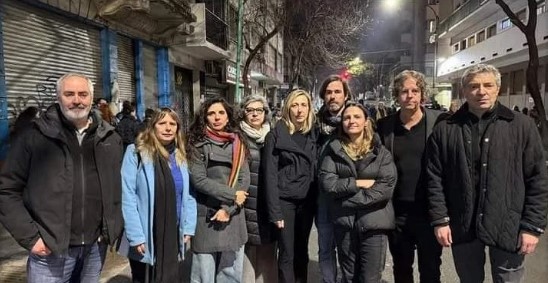
The leaders of the Left Front-Unity (FITU) Alejandro Bodart (International Socialist League- LIS), Myriam Bregman (Izquierda Diario- PTS), and Juan Carlos Giordano (International Workers' Unity- UIT) showing their support for the former president of Argentina at Cristina Kirchner's house
On June 10, 2025, former Argentine President Cristina Kirchner was sentenced to prison for serious corruption offenses, embezzling millions of dollars in a scandalous theft of public funds amidst widespread public and economic collapse and rejection of Peronism by workers and the general population. Cristina Kirchner is the leading figure of Argentine "progressive" politics, and among those who came to her defense were self-proclaimed "Trotskyist" groups who went to the former president's home to offer her support, arguing that she was a "political outcast ." These organizations even called on Peronist groups like La Cámpora to wage " a national struggle, with massive mobilizations throughout the country" against the verdict against Cristina Kirchner.
Those who proposed this policy include the MST group of Alejandro Bodart-LIS, the PTS-Izquierda Diario group of Myriam Bregman, the Workers' Party of Gabriel Solano, the Socialist Left (IS) of Juan Carlos Giordano-UIT, the New MAS of Manuela Castañeira, and the Workers' Politics group of Altamira, among others. These groups, which claim to be "Trotskyist," are promoting a policy of betrayal of the working class, a capitulation to Cristina Fernández de Kirchner, Peronism, and bourgeois democracy. The leaders of these groups shamefully kneel before and rush to kiss the rings of a bourgeois leader who defends capitalism. To justify this policy, they blatantly lie, claiming that the imprisonment of the corrupt former president is "a proscription" and an "anti-democratic advance," which is completely false. They lie by conflating democratic freedoms with the bourgeois democratic regime, two entirely different things.
The betrayal and class collaborationist policies of these groups did not begin on June 10, 2025. In reality, they had been developing for some time, as these groups had been voting for "progressive" laws from bourgeois parties in Parliament and maintaining a shameful policy of "unity" with Kirchnerism and Peronism. When Peronism was in power, a semi-hyperinflation erupted, severely damaging the people, and the "Trotskyist" groups never called for the defeat of the government and its plan. Their policy of being a mere appendage of the old bourgeois party became evident when, on April 12, 2025, they formed an inter-bloc with Peronism called "FITU-National and Popular." With this, the FITU deputies went down in Argentine history as the first to renounce the policy of class independence in Parliament, establishing a parliamentary inter-bloc with business sectors.
Brazil: "Trotskyism" in Lula's capitalist government
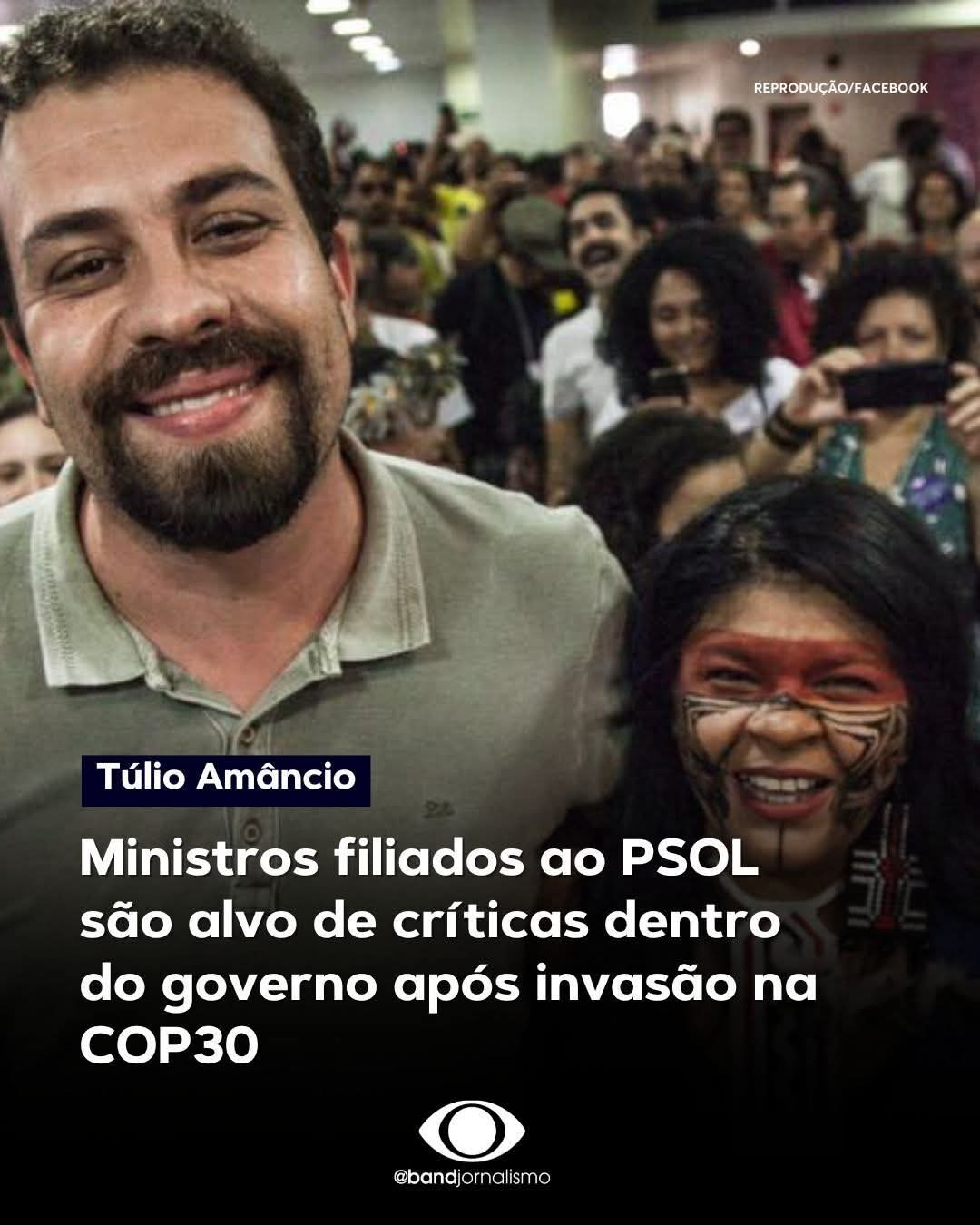
Guilherme Boulos, leader of the PSOL and Chief of Staff (Casa Civil) of Lula da Silva's capitalist government, and Sonia Guajajara, head of the Ministry of Indigenous Peoples for the PSOL
On October 21, 2025, Lula da Silva, the president of Brazil's "progressive" capitalist government , announced the appointment of Guilherme Boulos, leader of the Socialism and Liberty Party (PSOL), as the new Minister of the General Secretariat of the Presidency. This position of utmost importance in the bourgeois state was thus filled by a "progressive" party like PSOL, whose leader is Guilherme Boulos, a prominent figure in the Progressive International. PSOL is part of the ruling capitalist political coalition and is comprised of numerous groups that call themselves "Trotskyist," which have been pursuing a policy of class collaboration and populist fronts with Brazil's capitalist government.
Within the PSOL are groups of the Mandelist current such as the Socialist Left Movement (MES) led by Luciana Genro and Pedro Fuentes, "Insurgency" led by Renato Roseno, " Subverta" led by Talíria Petrone and Flávio Serafini, "Resistance" led by Valério Arcary, and "Ecosocialist Rebellion" led by Juan Machado, among others. There is also the group "Freedom, Socialism and Revolution" led by Andre Ferrari, which belongs to Socialist Alternative (SA), the group that capitulates to the DSA in the US, and "Socialist Revolution" led by Douglas Diniz and Silvia Letizia, which belongs to the LIS (International Socialist League), which capitulates to Kirchnerism in Argentina.
All these groups, despite calling themselves "Trotskyist," betray the workers and the people of Brazil by being part of Lula's capitalist coalition and government. In this way, they carry out a policy of class collaboration and populist fronts in Brazil in the name of a supposed "Trotskyism" or "Marxism" —a reprehensible policy by the leaders of all these organizations that exposes the crisis of the Brazilian left. In this case, those who were once revolutionary militants, as a result of the social-democratization process, have become entrenched as functionaries of the government and the bourgeois state.
The PSTU of the LIT-CI deserves special mention. This group, which was once part of orthodox Trotskyism, shattered into a thousand pieces in 2025, when its current leadership, headed by Eduardo "Edu" Almeida and Vera Lúcia Salgado, publicly broke with orthodox Trotskyism and the legacy of Nahuel Moreno. The revisionist leadership made its debut in Brazil by proposing to Lula's capitalist government "a front to confront imperialism," a truly absurd political move, as demanding that Lula confront imperialism is like asking cows to fly, something that will never happen. In fact, the crude "anti-imperialist" campaign alongside Lula was slapped in the face by reality when Lula and Trump reached a tariff agreement. With that campaign, the PSTU publicly joined the "progressivism" bandwagon and the Progressive International, but first it had to renounce Nahuel Moreno, which it meticulously did in order to develop, free of guilt, the same path of betrayal and opportunism as the rest of the world left.
France: Mandelists and Lambertists in the Popular Front
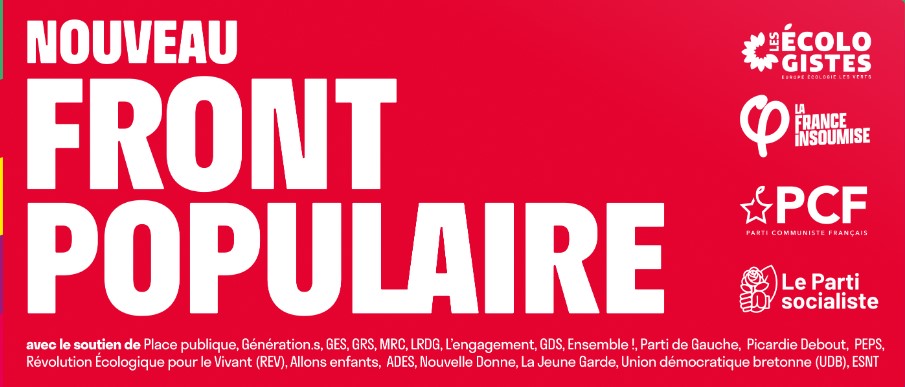
The quintessential populist front in France developed with the emergence of theNew Popular Front(NFP),acoalitionformed onJune 10, 2024, for the 2024 legislative elections. It comprises the Socialist Party, the Communist Party, the Greens, La France Insoumise, the Republican and Socialist Left, the New Anticapitalist Party, and other groups. The NFP is a capitalist coalition led by officials who have served in capitalist governments and who defend the French imperialist state and the regime of the Fifth Republic, such as the head of the Socialist Party, Olivier Faure, former Socialist president François Hollande, and the mayor of Paris, Anne Hidalgo.
The NFP also includes bourgeois Gaullist leaders such as Thierry Cotelle, Jean-François Delage, Catherine Coutard, and others. Jean-Luc Mélenchon, a leader of La France Insoumise, was a senator for the Socialist Party and an official in the Ministry of Education under Lionel Jospin's capitalist government. Two groups stemming from old currents of French Trotskyism—Mandelism and Lambertism—call for the integration of the people into this bourgeois front of class collaboration.
On one hand, there is the "Trotskyist" Mandelist group NPA, so named after Ernest Mandel, the Belgian leader who headed the Unified Secretariat of the Fourth International in the postwar period. Today, the New Anticapitalist Party (NPA; Nouveau Parti Anticapitaliste) is led by Christine Poupin, Philippe Poutou, and Olivier Besancenot of France, whose historical leadership, headed by Daniel Bensaïd, split the party to join Jean-Luc Mélenchon's capitalist coalition , La France Insoumise (LFI). By joining LFI, the NPA entered the New Popular Front. As Nahuel Moreno defined it, Mandelism has always been the center of revisionism in the world Trotskyist movement, and the capitulation of the leaders of French Mandelism is hardly surprising.
On the other hand, the Independent Workers' Party, led by Jérôme Legavre, Daniel Gluckstein, and Claude Jenet, among others, and stemming from the Lambertist "Trotskyist" tradition , is also part of the bourgeois coalition of the NFP. Lambertism is the Trotskyist current led by Pierre Lambert that ultimately capitulated to the Mitterrand government in the 1980s. Both Mandelism and Lambertism, now incorporated into the French NFP, are also examples of the politics of betrayal and class collaboration characteristic of these classic currents of global Trotskyism.
We conclude here this first part of the document intended to demonstrate the populist-front behavior of the self-proclaimed "Trotskyist" currents . We could add more examples from other countries, but that would be redundant, because these examples generally encompass all the currents. In the second part of this material, we evaluate the processes unleashed by the development of the global crisis of the left, a phenomenon that any activist can readily observe, but which only we at La Marx International analyze to provide a scientific explanation for the origin of the crisis and the necessary guidance for overcoming it. No other current in the world offers any kind of explanation for what is happening to the global left.
Part Two: A positive and progressive phenomenon
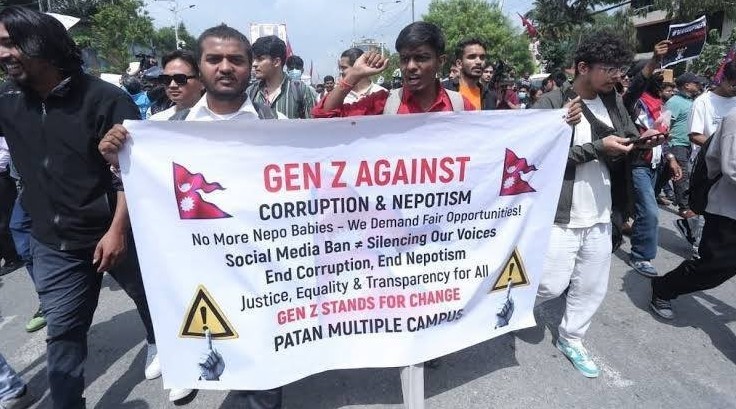
The global crisis of the left is a progressive and positive phenomenon because it signifies the crisis of reformism, social democracy, and revisionism worldwide. It represents a significant step forward in the struggle to resolve the global crisis of revolutionary leadership, since if these treacherous apparatuses were to strengthen, the goal of resolving the crisis of revolutionary leadership would become distant and far more difficult. As a result of implementing these policies of popular fronts and class collaboration, the global left is distancing itself from the masses and activism because the people and activists of the world are turning their backs on the old currents, parties, and leaderships, no longer believing in them and rejecting them.
Thus, social democracy in all its forms, classical Stalinism and its Maoist, Castroist, Guevarist, and other variants, bourgeois nationalist movements such as the PRI, Peronism, APRA, Nasserism, and former guerrilla groups like Sandinismo and Farabundo Martí National Liberation Front (FMLN)—all movements that were once attractive to millions of activists worldwide—are now sinking into a profound crisis due to the rejection and repudiation they face for their defense of capitalism. Self-proclaimed "Trotskyist" groups are experiencing a process of decline, disintegration, and eventual collapse, with cadres and militants distancing themselves from these organizations.
We call this global "earthquake" of people's rejection of all the old parties and leaderships a "political revolution." This concept was first formulated by Leon Trotsky in 1936, when he argued that to recover the "revolution betrayed" by the Stalinists in the Soviet Union (USSR), a revolution was needed to overthrow Stalinism, which had usurped power. This same concept was later updated by Nahuel Moreno starting in 1958, when he formulated that the political revolution is a revolution against Stalinism, but also against all counter-revolutionary apparatuses and leaderships in the world.
The peoples of the world began to undertake the task of world political revolution with the fall of the Berlin Wall in 1989, 35 years ago. A first phase unfolded there, marked by the collapse of Stalinism between 1989 and 1999, and, as Nahuel Moreno foresaw, the collapse of all counter-revolutionary apparatuses: social democracy, the old bourgeois nationalist movements, and so on. A second phase occurred between 2000 and 2010 when the political revolution was "frozen" as imperialism launched a global counter-offensive "against terrorism" and invaded Iraq. The defeat of this imperialist counter-offensive reopened the global crisis of capitalism, unleashed revolutionary waves, and "thawed" the political revolution , thus opening a third phase that we are experiencing today.
In this third phase, the political revolution began to sweep away the remnants of the large counterrevolutionary apparatuses, as well as autonomism, Islamic fundamentalism, Castro-Chavismo, and even began to strike at the very parties of the Progressive International. This creates the "illusion" of the political revolution, because the fall of the parties and apparatuses that have sustained bourgeois political regimes, both dictatorships and bourgeois democracies, produces a vast array of political and social phenomena that confuse bourgeois analysts, but also honest Marxists and activists. In the following section, we will address the "illusion" of the political revolution.
The "mirage" of political revolution: Dictatorships and bourgeois democracies in crisis
When Generation Z youth spearheaded the revolution in Nepal, the revolutionary process resonated with the global collective unconscious. The revolution in a remote and unfamiliar place became a topic of conversation worldwide. In Nepal, Gen Z youth burned down institutions such as the government house, the parliament, and the homes of wealthy officials, and they also burned down the headquarters of the Communist Party of Nepal. The Nepalese Communist Party had held power for years, defending capitalism, inequality, and poverty, making the burning of its headquarters an extraordinary and symbolic example of the global phenomenon of political revolution.
The process of global political revolution results in a weakening of capitalist regimes, both dictatorial and bourgeois-democratic, which are based on parties and leaderships in which the masses no longer believe. This provokes a true political "earthquake ," because it plunges dictatorships and regimes with fascist characteristics into crisis throughout the world: the Ukrainian revolution puts Putin's dictatorial regime in crisis, the Palestinian revolution puts the sinister State of Israel in crisis, the Syrian revolution ends the Al-Assad regime, the Arab Spring is a graveyard of dictators, the Venezuelan revolution puts Maduro's dictatorship in crisis, the revolution in Bangladesh liquidates the dictatorial regime of Sheikh Hasina Wazed, and so on, among other examples.
But the political "earthquake" is not limited to dictatorships. It also plunges bourgeois democratic regimes into crisis, a phenomenon expressed by mass sectors of the population abstaining from voting and turning their backs on bourgeois elections, manifesting as a "wave of abstention " sweeping the world. People began to express their rejection of bourgeois democracy around 2021 when high percentages of the population either did not vote, cast invalid ballots, or submitted blank votes. These percentages increased in Venezuela, Italy, Brazil, Peru, Iraq, Chile, and other countries, as well as in the US and Mexico, where abstention reached almost 50% .In some elections, such as the regional elections in France, abstention reached levels of 65.3%, historic highs since General Charles de Gaulle founded the Fifth Republic in 1958. In Chile, abstention reached such high levels that the government was forced to declare participation in the elections "mandatory."
The collapse of political parties and organizations that led the mass movement for decades impacts bourgeois democracy because the bourgeois democratic regime rests on bourgeois and reformist political parties. If these pillars collapse, the entire political regime collapses. The fact that the world's masses have begun to turn their backs on the propaganda of the bourgeoisie and reformist organizations is a sign of growing consciousness that is putting the bourgeois democratic regime in crisis and striking at all the political organizations that defend it, especially the reformist organizations.
The masses of the world are not voting because they have no one to vote for. They are breaking with their old leadership, but they find no alternative, so they prefer to abstain. The crisis of bourgeois democracy leads to the emergence of very weak capitalist governments, elected by a very small percentage of the population, which must govern amidst a brutal crisis of capitalism, causing constant crises and government collapses. Under the blows of political revolution, bourgeois democracy has become a Pandora's box for the ruling classes themselves.
This phenomenon, like what happens in Nepal, acts as a "mirage ." Even under the iron grip of fraud and the undemocratic bourgeois electoral mechanisms, it can happen that a "nobody" wins the elections, surpassing the traditional parties, as already occurred with Beppe Grillo, Meloni, Milei, Bolsonaro, etc.—figures or "outsiders" who were completely unknown two years before becoming president. These presidents, with their "neoliberal" and "reactionary" rhetoric , win elections with percentages of 25% or 30% of the total eligible voting population, which is the electoral base that these pro-capitalist political formations usually enjoy. But the world's pundits, opinion-makers, and bourgeois charlatans, upon seeing these election results, define the country's political situation as a "turn to the right."
As reformism collapses worldwide, the victories of "right-wing" movements are being replicated in various countries, leading bourgeois pundits and charlatans to label this phenomenon the "Rise of the Global Far Right ." But these governments lack mass support; on the contrary, they are very weak. Trump does not have the support of mass sectors in the US; on the contrary, his government is massively repudiated, and his electoral victory is a product of the Democratic Party's collapse. The same is true for Milei in Argentina, whose rise can only be explained by the collapse of Peronism. There would be a rise of the far right or fascism if mass sectors of the population supported these movements as a result of the crushing of the working class, as happened in Europe in the 1920s and 30s. But none of that is what is happening in reality.
Bourgeois analysts mechanically apply election results to define the political situation, speaking of a "rise of the far right" based on electoral outcomes, without considering what is happening with the class struggle. The same superstructural and bourgeois method is used by groups representing the 99% of the global left, a consequence of their break with Marxism. But we Marxists have a different method of analysis: We are not swayed by election results because we know they are a fraud orchestrated by the ruling classes. Elections do not reflect the reality of what the majority of the population thinks; they are merely the "mirage" of political revolution.
We Marxists conduct class analysis and understand the essence of the phenomenon. If young people in Nepal burn down the Communist Party headquarters, bourgeois analysts say:"The youth are rejecting communism and turning to the right." We say:"The youth are burning down the reformist parties that defend capitalism."If Trump or Milei win the elections, bourgeois analysts and 99% of the world's left will say: "There is an advance of the far right." We say: "The old parties and leaderships of the working class are collapsing; the government that emerges is very weak."The"mirage"of political revolution makes analysts, pundits, and illiterate leaders of the world's left spout nonsense. None of these processes surprise us Marxists because we understand the essence of the phenomenon: All the treacherous leaderships are collapsing, which weakens capitalism.
A theoretical-political framework for defending the populist front
The leaders of 99% of the world's left-wing groups have developed a flimsy political framework to justify their populist policies: the US and China are headed for World War III, fascism and the far right are on the rise, and we are living through a reactionary global era. The policy, they argue, is to unite with all progressives worldwide to stop fascism. And to prevent World War III, we must oppose all wars: peace for Palestine, peace for Ukraine, peace for Yemen, peace for Kashmir, etc., through "dialogue" between nations. This framework begins with "revolutionary anti-fascist" rhetoric and ends by proposing a " humanist " policy akin to that of the UN.
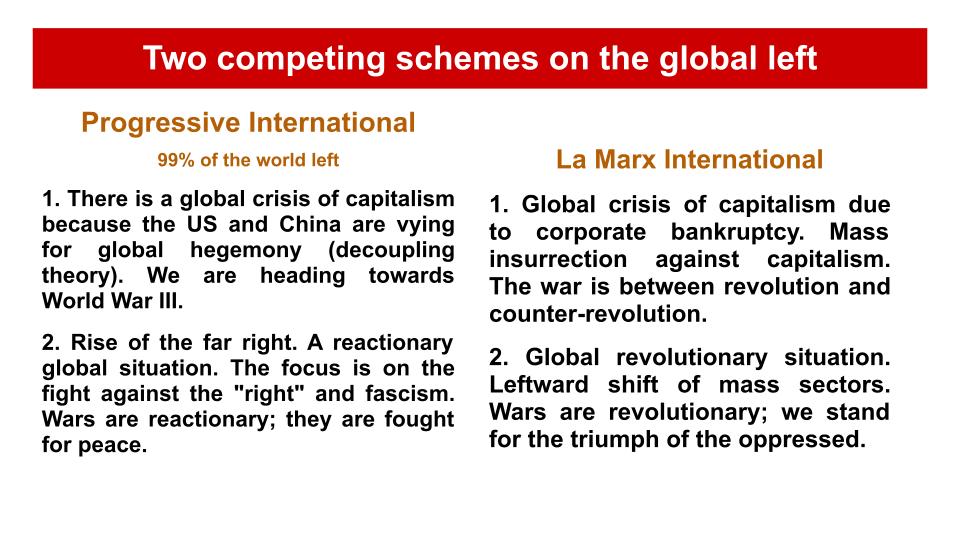
With this political framework, left-wing organizations worldwide have moved into the ranks of reformism. However, when they take these proposals to the streets, the organizations begin to feel the harsh blows of reality: They announce the rise of the far right, but Zohran Mamdani wins the elections in New York City, the capital of the world. They announce a reactionary era, but revolutions erupt on all five continents, in Bangladesh, Nepal, Peru, Ecuador, France, Ukraine, Palestine, and so on. They announce the rise of fascism, but Generation Z emerges worldwide. They announce their electoral participation, but people decide not to vote. They predict World War III, but it never happens. In other words, they are never right, not even by chance.
In turn, this treacherous policy is causing a serious process of decline and disintegration of all left-wing organizations worldwide. Militants are drifting away, and groups are becoming smaller, more marginal, and insignificant. Their policies only gain traction among the most affluent, petty-bourgeois sectors of university youth. As a result, there are no left -wing organizations today that are growing or strengthening; on the contrary, the landscape is one of the absence of a global pole to organize and attract activists from around the world, a consequence of the serious process of dispersion and dissolution of all left-wing organizations worldwide, without exception.
In turn, the break with the Marxist principle of class independence leads to a break with all principles . However, a current of cadres and militants is beginning to emerge that opposes the course to the right and social democratization. Many honest comrades, fed up with betrayals and lies, are slamming the door, breaking with these treacherous leaderships, and beginning to resist the course toward reformism. These are still centrist tendencies, many of which do not yet consider organizing with orthodox Trotskyism, but they have embarked on a path of no return: the break with the reformists to regroup around the revolutionaries. This movement reflects a deeper process: the emergence of new, highly progressive processes within global activism that are oriented toward the search for a revolutionary project .
The new phenomena and movements of global activism
The revolutionary waves and processes unfolding across five continents are giving rise to a generation of thousands of activists engaged in labor, democratic, feminist, racial, climate, national independence, and sexual oppression struggles, among others. Our politics are directed toward the masses, but through them we seek to win over this emerging global activism , which constitutes the vanguard of the revolution against capitalism.
This activism provides the raw material for building a revolutionary leadership because, unlike in the 20th century, it is independent and rejects the traitorous apparatuses. In the 20th century , after the end of World War II, the counter-revolutionary apparatuses—Stalinism, social democracy, bourgeois nationalist movements, etc.—were very strong, with millions of members, and the best of global activism was found within these organizations.
In the 21st century, the thousands of activists emerging across five continents belong neither to social democracy, nor to Stalinism, nor to bourgeois nationalist movements, nor to guerrilla movements, nor to anything else. They may have sympathies with certain leaderships, but they remain independent and outside of all these organizations; this is why the 21st century is the century of political revolution par excellence. By being independent of all the treacherous apparatuses, activism develops self-organization, self-defense, and self-determination, allowing new leaders to emerge more rapidly and confront and surpass the old leaderships.
Around these processes developed the First Lines, the self-defense organizations that emerged between 2019 and 2024 in the revolutions in Chile, Colombia, Hong Kong, Ukraine, the Yellow Vest movement in France, and the Black Lives Matter movement in the US. This process escalated into armed civil war in the confrontations against Putin's invasion of Ukraine, the revolution in Yemen and the resistance against the Saudi Arabian Armed Forces, the Third Intifada and the armed guerrilla war that has held back the Israeli army, and the Rojava revolution against ISIS, among other examples. The combination of these movements gave rise to an independent global mobilization process not directed by any political current: the Third Intifada.
A global mobilization of activism began, sweeping across the world like lightning. It encompassed every country, was massive in scale, and had its epicenter in imperialist countries, with milestones such as the occupation of universities in the US, general strikes in Italy and Spain, and so on. The activism raised the level of the mobilizations' program, moving from the basic demand of rejecting genocide to "a free Palestine from the river to the sea ," and finally to "death to the IDF." The mobilization process, and the maturation that culminated in the Third Intifada, gave rise to another movement: Generation Z. This movement began to shake the world with expressions in Nepal, Morocco, Peru, Paraguay, Indonesia, Mexico, and elsewhere. It is a very progressive and positive phenomenon of sectors of youth who see no future under capitalism and are beginning to outline a minimum program of demands that will continue to develop, but which cannot be resolved within the framework of the bourgeois state.
Regardless of the programs these movements adopt, the logical confusions of the activism leading these revolutionary processes, and the intervention of bourgeois sectors aimed at derailing the process, the reality is that all these phenomena—from the First Lines to the Third Intifada and Gen Z—are self-organized processes, outside of political regimes, with a strong component of self-determination. They develop a tendency toward dual power, challenging the power of the bourgeois state. We call this dynamic the "process of sovietization," referring to the soviets or dual power bodies that emerged in the Russian Revolution. That is, it is a process by which the masses challenge state power through their independent self-determination, with independent militias, pickets, or other forms of self-organization and self-defense that emerge in these revolutions and mobilizations.
The process of developing this global activism involves a life-or-death battle to win over the majority of this vanguard to Marxism. All counter-revolutionary organizations worldwide seek to sterilize the revolutionary tendencies of activism and divert those tendencies toward reformism to prevent the emergence of revolutionary leaderships capable of abolishing capitalism. It is a life-or-death battle for global activism. And to wage this battle and defeat the reformists, we need to establish a clear and precise direction for advancing the regrouping of revolutionaries.
Winning global activism for Marxism
Given the importance and development of this global activism, which is massive and present on all five continents, the battle to win this activism over Marxism requires the emergence of a clear alternative pole in defense of Marxism and its principles. It is with this task in mind that we began to establish various orientations that have attracted comrades from every continent, from Southeast Asia to Spain and France, from Colombia to Mexico—comrades who are breaking with these reformist organizations and seeking a revolutionary alternative.
Reformism is globally in crisis. Leftist organizations worldwide that have embraced reformist strategy are reaching a profound crisis because reformism lacks material support amidst the collapse of capitalism. The organizations of the 99% of the global left did not arrive at reformism by chance, but rather through a profound process of ongoing counterrevolution within their own ranks, in which thousands of cadres and militants were expelled. Popular frontism, even when carried out by an organization claiming to be Trotskyist, is Stalinism in substance, and Stalinism necessarily involves slander and methods at odds with revolutionary morality. There is no popular frontism without Stalinism, and there is no Stalinism without slander and the moral decay of its leaders.
Stalinist methods led to the expulsion of thousands of valuable comrades who were betrayed, causing ruptures, crises, fragmentation, and the disappearance of entire currents in a process that lasted decades. Without this crushing of thousands of cadres who defend Marxism, the current reformist left, in its process of disintegration and decomposition, could not exist. However, as part of the leftward shift among mass sectors and sectors of global activism, thousands of valuable and honest comrades continue to seek answers in Marxism. For these honest comrades from different traditions, and for the new activists who are drawn to Marxism, the choice is the same as it has always been throughout history: Reform or Revolution.
How do we regroup these comrades? The first step is to lay this dilemma on the table: What do you choose? A reformist project or a revolutionary one? If you choose a reformist one, you have the entire world left; you have plenty to choose from. But if you choose a revolutionary one, here is our project; there is no other revolutionary project. There isn't one because the first condition for a project to be revolutionary is class independence, and 99% of the world left collaborates with bourgeois projects and has abandoned the struggle for the principle of class independence, as we have explained in this document.
But the defense of the principle of class independence is not the only reason why the Marx International is the only revolutionary project. The other reason is the program. We need to regroup revolutionaries, but this is a task that cannot be carried out around just any program, but only around the program of orthodox Trotskyism. It is not serious to regroup without these foundations. Any regrouping process that is not carried out around these solid bases will inevitably lead to crisis under the inevitable blows of the events of the world class struggle.
The only serious, Marxist program is that of orthodox Marxism, as implemented by Nahuel Moreno. That is to say, it's not just class independence that matters, but the Marxist tradition; we have a past, we didn't come from nothing. Those who claim that the crisis of revolutionary leadership is resolved through "left-wing unity" without specifying which tradition that unity should be based on are lying. Those who say that tradition doesn't matter and that there is no revolutionary tradition are lying, because they falsify the history of Trotskyism and Marxism. Social democracy and Stalinism didn't emerge from nothing; they arose as part of movements that revised Marxism, theorized about it, and constructed programs to refute Marxism in order to carry out this revisionism.
We uphold "orthodox Trotskyism" because it is the only true Marxism . It is true because it was born to combat revisionism; that is the history of Marxism, and it is impossible to hide it. On the contrary, we must make it known so that global activism understands that Bolshevism and Trotskyism have a shared history, one that has shaped and educated us. Nahuel Moreno's teaching is that without the struggle against revisionism, there is neither Trotskyism nor Marxism . Our stance toward global activism is clear: we do not amalgamate, we do not seek to disguise our positions, we do not look for a savior tactic, and we do not beat around the bush. Debates are conducted head-on, and it is best to be honest to clarify relationships. From the regrouping of revolutionaries around Marxism, we can begin the battle for the reconstruction of the Fourth International.
Without class independence, without the struggle against revisionism, and without denouncing treacherous leaderships, there is no revolutionary regrouping. Once we understand the fundamental trends of the world situation, the class struggles, and the tasks of regrouping revolutionaries, let us begin to advance all global activism on the offensive, calling them to the single urgent, necessary, and present task. The new leaderships that emerge will be centered around Marxism, which is orthodox Trotskyism, and the revolutions will only serve to fuse us more strongly with the new global activism to abolish capitalism and impose global socialism.


